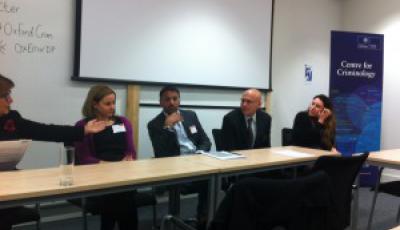Wrongful Conviction and the Death Penalty: The Inevitability of Error?
Posted:
Time to read:
What are the sources of wrongful convictions in capital cases? Are retentionist countries abiding with international procedural safeguards put in place to prevent them? How are lawyers, investigators, governmental officers, campaigners, and journalists dealing with the issue? Can their combined efforts contribute to the wider cause of total abolition? Is it possible to create a ‘perfect’ system that eliminates the risk of wrongful convictions? Or do we need to accept the inevitability of human error while capital punishment is retained?

The seminar opened with a session assessing recent research findings on wrongful convictions and the death penalty, and was chaired by Professor Roger Hood. Speakers such as Professor Carolyn Hoyle, Dr Mai Sato, Dr Sarah Lucy Cooper and Saul Lehrfreund, shared their insights on the topic.
Professor Carolyn Hoyle opened with a worldwide overview on the main sources of wrongful convictions in capital cases. She reviewed the international procedural safeguards put in place to ensure due process and the minimization of error, and assessed the level of compliance these protections have achieved amongst retentionist countries, globally. She stressed the wide gap still existing between the aspirations of international procedural law and actual practices, particularly in many Asian, Middle Eastern, and African countries. The only way to reform the death penalty and decrease the number of wrongful convictions, she argued, is to narrow this gap. However, while bringing obvious benefits, due process reforms also risk to give the impression of a ‘civilized’ process, legitimizing the death penalty in the eyes of the public. If we aim to achieve total abolition, the innocent frame therefore needs to be completed by a principled human rights framework.

Dr Sarah Lucy Cooper shared her experience as a fellow at the Arizona Justice Project, an NGO dealing with a wide range of capital cases. She argues that in the United States the challenge is to overcome deeply held beliefs amongst criminal justice professionals, such as the idea that precedent and/or pardon will provide a remedy for the conviction of the innocent, or the opinion that innocence claims can be presented diligently. These central assumptions, she argues, undermine defence lawyers’ ability to successfully carry out innocence claims, which in turn has negative impact on delivering justice in these cases.
Saul Lehrfreund discussed the ‘inevitability of error’ in capital cases and sketched the impact of international procedural safeguards on the handling of death penalty cases across the world. He argued that despite a heightened sense of scrutiny, even countries embracing a ‘superdue process’ such as the United States, often fail to comply with the minimum requirements, supporting current views on the ‘inevitability of error’ in capital cases.
The second session shifted the angle of the discussion to campaigns, investigations and activism, and was chaired by Dr Jon Yorke. Journalists, activists, and lawyers such as David Rose, Oluwatosin Popoola, and Hannah Gorman, shared their professional perspective on the death penalty issues.

Oluwatosin Popoola provided an overview of death penalty exonerations across the world, and joined the other speakers in stressing Amnesty International’s opposition to the death penalty in all cases, as a fundamental human rights violation.

The third session turned to the role of soft power and litigation in influencing death penalty policies and increasing due process standards in foreign retentionist countries. It included presentations by Christopher Layden and Parvais Jabbar, who discussed the difficulties encountered when operating in former Commonwealth countries.
Christopher Layden illustrated the strategies followed by the Foreign Commonwealth Office to shape death penalty policies in former British colonies that still retain capital punishment. He argued that trying to force change in countries with a long history of colonial domination is not an effective approach to the problem. For this reason, the government is pursuing a softer strategy, aimed at influencing change by showing the attractiveness of the British ‘way of life’, providing legal aid, and organizing international visits by members of the British parliament.
Parvais Jabbar closed the session by sharing his experience as a defence lawyer litigating capital cases at the Judicial Committee of the Privy Council. He highlighted how under the influence of international human rights law, the Privy Council has recently moved from a hands-off policy to a more interventionist approach. This has led to the discovery of repeated procedural violations in countries following under its jurisdiction, often resulting from the inadequate provision of legal aid that increases the risk of wrongful convictions.
The conference closed with a panel discussion chaired by Baroness Helena Kennedy, principal of Oxford Mansfield College. The panel examined the extent to which current innocence debates might influence the wider discussion about the legitimacy of capital punishment. Further, it discussed the possibility of future abolition.

Throughout the day, students were given the possibility to meet the speakers and discuss internship opportunities at the UK Foreign and Commonwealth Office, Death Penalty Project, Reprieve, and the International Commission.
The conference was generously supported by the Oxford Law Faculty Research Support Fund and the Death Penalty Project.
Keywords:
Share:
